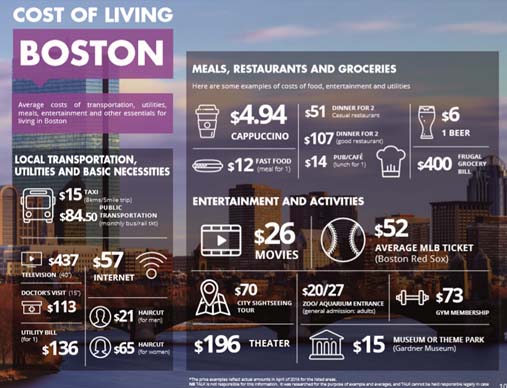Your Budget: Ignore Hidden Costs at your Peril!
Everything adds up, including all those hidden costs. When you study abroad, your big-ticket items are going to be tuition, airfare, accommodation and food. The smaller costs like entertainment, transportation, cell phone bills, and clothes can easily be overlooked but if you identify all those ‘small’ or hidden costs from the get-go, you not only avoid exceeding your budget, you learn how you can reduce your costs and still have a great time!
Hidden costs when managing your budget
Let’s break down the primary costs:
- Application Fee to your English school of choice
- Tuition
- Housing Many programs have a variety of options for student housing, from campus dorms, to apartments, to host houses. Look at any additional costs that come with each option, then choose the option that best fits your budget.
- Passport (new or renewal cost)
- Student Visa
- Airfare Do some research online to see if there are times of the year when airfares to your destination are discounted. Online travel sites and apps identify the best times, days of the week, even months, to book your flight, compare fares of major and low-cost carriers. Be flexible with your dates. Avoid holiday periods. Book early.
- Food & Drink Trying new food in an important part of integrating and experiencing a new culture, but too much eating out will take a toll on your wallet. Designate some nights per week for eating at home and prepare some snacks at home to take with you to class.
Hidden Costs:
- Travel Insurance
- Medical Insurance
- International Student Identification Card The International Student Identification Card (ISIC) is a discount card used by students traveling abroad. The US ISIC, which is valid for 16 months, costs $26 for the basic card. ISIC offers you very good discounts on everything from hotel or hostel accommodation to car hire, museum entrance fees, and restaurants.
- Cell Phone Fees Being in a new country, you may have to invest in a new cell phone plan. Research different phone and internet packages in the USA. Remember, many international plans are paid for by the minute, so keep your international calls as brief as possible!
- Travels While on Your Trip You want to take some smaller trips to explore the USA. Factor in for short flights, accommodation, car hire, excursions, etc. research the costs involved in visiting your dream destinations and budget accordingly.
- ATM Fees Check with your bank the charges for International ATMs and outside bank fees.
- Transportation
- Sports, Hobbies and Entertainment
Hidden costs are those which are overlooked but which you cannot avoid. A savvy budget minded student will also look to these ways of saving money as a study abroad student:
- Avoid Agent Fees Research online websites that offer English courses in the USA. Our e-Guide shows you how to research English schools, courses, costs such as accommodation. When you book directly with a school, you can save a lot. You do not pay expensive fees (up to $5000) that placement agencies usually charge for this service.
- Choose the Best Time to Study in the USA Most destinations have a high and the low season. The high season is more expensive in terms of airfares, accommodation and much more. The tourists drive up costs in restaurants, for cab fares and attractions. And, because the city is full of tourists, it may make it more difficult to adapt to local life. If you have a choice, choose to study in the low season in that destination. Some schools might even offer their courses at a lower price to encourage students to enroll then. Accommodation is cheaper, classes tend to be smaller and the city quieter.
- Exchange Rates Firstly, it’s important to know to exchange rate of your currency to US$ and to keep track of it as rates of exchange can vary daily, even seasonally. To get the best rate when you transfer your currency into US$, there are a few things you can do
• Compare the exchange rate offered at different banks, currency exchange kiosks, whether you use a debit or credit card at ATMs, wire transfers, or digital money providers such as Xoom. These vary widely and if you know the facts, you can stretch your currency
• Compare the fees that are charged for the service – some banks charge high international wire transfer fees, others, like Western Union, are more competitive. If you have an account with a bank, your money transfers fees are likely to be less.
Let’s look an example of average costs of one city in which TALK English Schools has a center. We checked a Cost of Living Comparison website to check how hidden costs which we often overlook add up ….

 So, yes, there’s plenty of food, fun, and culture that won’t break the budget. In fact, the amount of amazing fun things to do for cheap or free is where cities in the US really rock! Download our e-Guides series and learn more!
So, yes, there’s plenty of food, fun, and culture that won’t break the budget. In fact, the amount of amazing fun things to do for cheap or free is where cities in the US really rock! Download our e-Guides series and learn more!




















